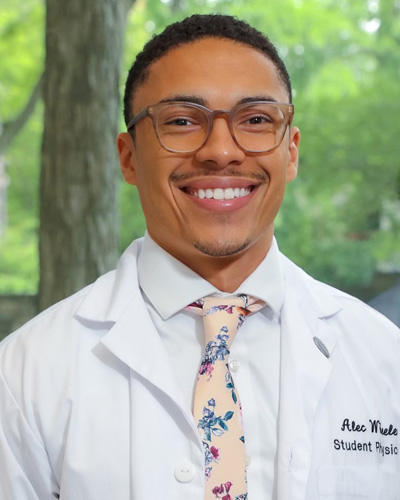PCOM Student Accepted into UCSD Urological Research Program
Student Research Spotlight
August 21, 2023 As the first Philadelphia College of Osteopathic Medicine (PCOM) student accepted into a highly competitive urological research program at the University
of California at San Diego (UCSD), Alec Wheeler (DO '26) has a drive for achieving
his goals.
As the first Philadelphia College of Osteopathic Medicine (PCOM) student accepted into a highly competitive urological research program at the University
of California at San Diego (UCSD), Alec Wheeler (DO '26) has a drive for achieving
his goals.
Earning his bachelor's degree at Lycoming College and master's degree at Duke University
before being accepted into PCOM's Doctor of Osteopathic Medicine (DO) program, Wheeler was accepted into the eight-week UCSD research program that aims
to expose medical students to Urology. Offering research fellowships, professional
development, and career mentoring, the program is offered to “outstanding medical
students whose research, teaching, and service will contribute to diversity and growing
the urological community.”
Wheeler is highly respected by his instructors and mentors alike. “I was first introduced
to Alec by Dr. Kent Tracte, President of Lycoming College, who asked me to guide promising
pre-medical students at Lycoming – Alec was one of them,” said Marina Vernalis, DO
'77, FACC, former Chief of Cardiology and Cardiovascular Consultant to the U.S. Army
Surgeon General, Walter Reed Army Medical Center. “His acceptance at PCOM was the
culmination of his unrelenting efforts and his vision of making a tangible impact
on healthcare. I am filled with pride in witnessing his remarkable journey from his
humble beginnings at Lycoming to being a stellar osteopathic medical student.”
“I worked with Alec and some of his classmates in the anatomy lab,” said Michael P. McGuinness, PhD, vice chair in the Department of Bio-Medical Sciences. “It was clear that he was
a good student looking for ways to tweak how he studied to improve his grades. The
research opportunity at UC San Diego is a sign that he is dedicated to expanding his
education beyond the classroom.”
Can you briefly describe your background and how you came to PCOM?
I went to undergrad at Lycoming College and had an interest in public health. I earned
my master's in Biomedical Sciences at Duke University before working in Washington,
DC, for the Department of Health and Human Services where I helped address public
health issues such as social isolation and loneliness during the pandemic. While there,
I co-authored a journal article on this topic with Dr. Vivek Murphy, the current U.S.
Surgeon General. My mentor, Marina Vernalis, DO '77, FACC, former Chief of Cardiology
and Cardiovascular Consultant to the U.S. Army Surgeon General, is a Lycoming and
PCOM alum and sparked my interest in attending PCOM.
What was the focus of your research?
Health disparities in urology, particularly around access and barriers to care. A
lot of our work is around trying to figure out what those barriers to care are and
it can come from lack of information or health literacy or education levels, depending
on where someone is, and then also something called PSA screenings, which are a big
indicator of whether or not someone could potentially have prostate cancer. A lot
of people just don't get PSA screenings done, particularly in the African-American
community.
What were your responsibilities on the research project?
Data collection, writing the paper, and meeting with the team to discuss steps. I
will be first author, and through my program at UCSD, I will continue research with
them for the next few years. This is a longitudinal program, so I will continue our
research during my four years in medical school. This fellowship was fully funded
and paid for by UCSD, which included housing, travel, and the research is fully funded.
In addition, I receive automatic admission to do away rotations during my four years
at any of the UC campuses with Urology residency programs.
What prompted you to pursue research?
I was accepted into the urology fellowship program at UCSD. I got into PCOM and had
an interest in urology and connected with some past graduates, who just told me about
fellowship programs that I could apply for, and I applied for a few across the country
and was accepted into the one at UCSD.
About Philadelphia College of Osteopathic Medicine
Established in 1899, Philadelphia College of Osteopathic Medicine (PCOM) has trained
thousands of highly competent, caring physicians, health practitioners and behavioral
scientists who practice a “whole person” approach to care—treating people, not just
symptoms. PCOM, a private, not-for-profit accredited institution of higher education,
operates three campuses (PCOM, PCOM Georgia and PCOM South Georgia) and offers doctoral degrees in clinical psychology, educational psychology, osteopathic
medicine, pharmacy, physical therapy, and school psychology. The college also offers
graduate degrees in applied behavior analysis, applied positive psychology, biomedical
sciences, forensic medicine, medical laboratory science, mental health counseling,
physician assistant studies, and school psychology. PCOM students learn the importance
of health promotion, research, education and service to the community. Through its
community-based Healthcare Centers, PCOM provides care to medically underserved populations.
For more information, visit pcom.edu or call 215-871-6100.
Contact Us
For general media inquiries, please contact the Office of Marketing and Communications
at 215-871-6300 or communications@pcom.edu. Visit our media relations page to view contact information for public relations personnel.
Connect with PCOM

 As the first
As the first 